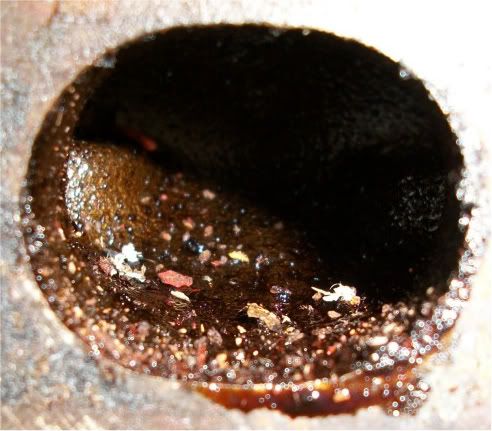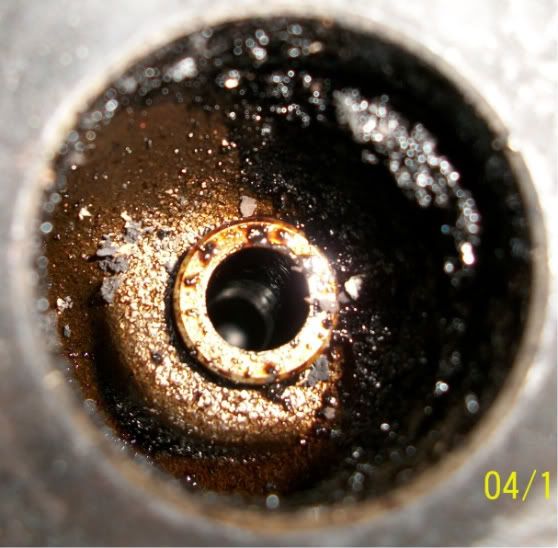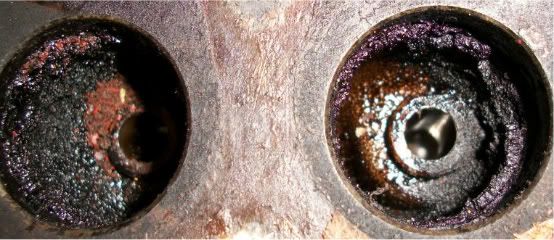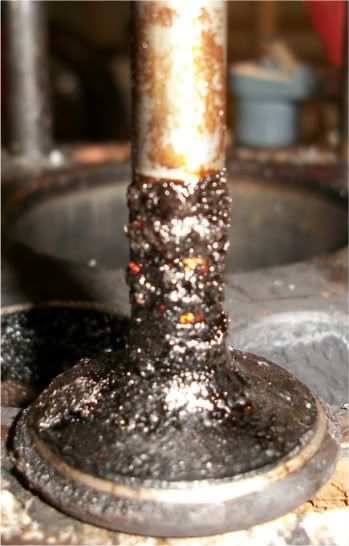(Taken from Moyer Marine Spring Newsletter)
"The Breath of Life"
It's obviously difficult to know for sure, but given the number of engine issues showing up in recent years resulting from confirmed excessive exhaust back pressure, we believe that at least half of the Atomic 4 fleet may be suffering from some elevation of exhaust back pressure over the factory recommended range of 1 to 1.5 psi.
Many of the early symptoms of elevated exhaust back pressure (3 to 4 psi) mimic other conditions such as a rich fuel condition, low compression, poor ignition, or all of the above. Specific symptoms include uniformly sooty plugs, carbon build-up on valves and rings, caramelized goo on intake valve stems, and in worst cases (usually when back pressure exceeds 6 psi), one or two cylinders will refuse to fire.
Two most common causes of elevated back pressure are mineral build-up in the hot section where the engine cooling water enters (see photo below), and the inner lining in the first several feet of the rubber hose on the discharge end of water lift mufflers breaking away from the rest of the hose and crumpling up on itself.
Measuring the back pressure at the exhaust manifold flange is the direct manner of determining whether or not you have a problem. Otherwise, if you have the symptoms and you've insured that the other causes are not present, it's probably time to remove your hot section for a look (the hard pipe between the manifold and the inlet to the muffler).
What may be new to many of you is the fact that when an engine is struggling for intake air, it will develop many of the same symptoms as restricted exhaust. In both cases, the smooth flow of air and exhaust through the engine is restricted. A very interesting recent case involving symptoms of elevated exhaust pressure (including sticky intake valves) turned out to be the result of setting a briefcase in the lazarette in such a manner as to block the 6" diameter vent between the engine compartment and lazarette. The lesson from this episode is simple: if your engine compartment is well sealed, be sure that the vent for the engine air supply is adequate and unrestricted. We don't have a lot of data regarding an exact vent size, but a 6" diameter vent appears to be adequate. Obviously, a severely clogged flame arrester element can cause the same "breathing" issue for an engine.
Hi,
This is GREAT info.! This is exactly what I was experiencing as a
significant problem last year. With the help of some fellow sailors at my
marina, this is what we came up with also. Initially I didn't appear to be
exhausting enough water, the exhaust water was sooty, steamy, and engine
temp. was elevated/overheating at higher RPMS. and workload. I'm pretty sure
that engine performance wasn't "up to snuff" either (only my 2nd full season
& most of the time was spent under sail previously). Since the boat was
already in the water I just "took it easy" for the season. At the end of the
season, when the boat was out of the water, I took apart the exhaust, at the
manifold through the last rubber hose at the boat aft. The first hose going
into the muffler was just like you describe, crumpling in on itself, while
the rest of the exhaust system appeared to be absolutely clear. My cast iron
exhaust pipes were not clogged, but have worn a little thin, so I went to
the local plumbing supply store in order to find replacements. I'm looking
forward to the exhaust rebuild as being the fix for this season. Thanks for
reinforcing my troubleshooting conclusions.
Pete
Congratulations Pete! Yours was a really classic case of elevated exhaust
back pressure and you did a great job of troubleshooting and remediation.
It would be wonderful if you could come up with a few photos of the inside
of your rubber hose with the crumpled up inner layer and post them in the
exhaust section of the Community Forum at moyermarine.com (or just a text
only description if you already discarded the hose). It's difficult for
anyone who hasn't experienced such an episode to clearly explain how it
feels.
Thanks again for your feedback,
Don Moyer
See my attached photos & Good Luck to all other sailors!
Pete
"The Breath of Life"
It's obviously difficult to know for sure, but given the number of engine issues showing up in recent years resulting from confirmed excessive exhaust back pressure, we believe that at least half of the Atomic 4 fleet may be suffering from some elevation of exhaust back pressure over the factory recommended range of 1 to 1.5 psi.
Many of the early symptoms of elevated exhaust back pressure (3 to 4 psi) mimic other conditions such as a rich fuel condition, low compression, poor ignition, or all of the above. Specific symptoms include uniformly sooty plugs, carbon build-up on valves and rings, caramelized goo on intake valve stems, and in worst cases (usually when back pressure exceeds 6 psi), one or two cylinders will refuse to fire.
Two most common causes of elevated back pressure are mineral build-up in the hot section where the engine cooling water enters (see photo below), and the inner lining in the first several feet of the rubber hose on the discharge end of water lift mufflers breaking away from the rest of the hose and crumpling up on itself.
Measuring the back pressure at the exhaust manifold flange is the direct manner of determining whether or not you have a problem. Otherwise, if you have the symptoms and you've insured that the other causes are not present, it's probably time to remove your hot section for a look (the hard pipe between the manifold and the inlet to the muffler).
What may be new to many of you is the fact that when an engine is struggling for intake air, it will develop many of the same symptoms as restricted exhaust. In both cases, the smooth flow of air and exhaust through the engine is restricted. A very interesting recent case involving symptoms of elevated exhaust pressure (including sticky intake valves) turned out to be the result of setting a briefcase in the lazarette in such a manner as to block the 6" diameter vent between the engine compartment and lazarette. The lesson from this episode is simple: if your engine compartment is well sealed, be sure that the vent for the engine air supply is adequate and unrestricted. We don't have a lot of data regarding an exact vent size, but a 6" diameter vent appears to be adequate. Obviously, a severely clogged flame arrester element can cause the same "breathing" issue for an engine.
Hi,
This is GREAT info.! This is exactly what I was experiencing as a
significant problem last year. With the help of some fellow sailors at my
marina, this is what we came up with also. Initially I didn't appear to be
exhausting enough water, the exhaust water was sooty, steamy, and engine
temp. was elevated/overheating at higher RPMS. and workload. I'm pretty sure
that engine performance wasn't "up to snuff" either (only my 2nd full season
& most of the time was spent under sail previously). Since the boat was
already in the water I just "took it easy" for the season. At the end of the
season, when the boat was out of the water, I took apart the exhaust, at the
manifold through the last rubber hose at the boat aft. The first hose going
into the muffler was just like you describe, crumpling in on itself, while
the rest of the exhaust system appeared to be absolutely clear. My cast iron
exhaust pipes were not clogged, but have worn a little thin, so I went to
the local plumbing supply store in order to find replacements. I'm looking
forward to the exhaust rebuild as being the fix for this season. Thanks for
reinforcing my troubleshooting conclusions.
Pete
Congratulations Pete! Yours was a really classic case of elevated exhaust
back pressure and you did a great job of troubleshooting and remediation.
It would be wonderful if you could come up with a few photos of the inside
of your rubber hose with the crumpled up inner layer and post them in the
exhaust section of the Community Forum at moyermarine.com (or just a text
only description if you already discarded the hose). It's difficult for
anyone who hasn't experienced such an episode to clearly explain how it
feels.
Thanks again for your feedback,
Don Moyer
See my attached photos & Good Luck to all other sailors!
Pete





Comment